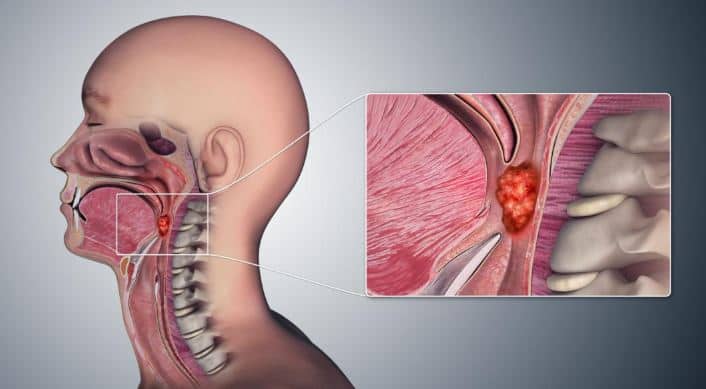It’s important to spot throat cancer symptoms early to ensure you get treatment on time.
However, the only way you can know that you may be at risk of having this disease is knowing what the signs or symptoms are.
The same can be said about gaining full knowledge about what throat cancer is, its causes, treatment, when to see a doctor, and even throat cancer survival rate.
There are also symptoms that may occur in men, women, child, dog, or based on a person’s age.
We’ve outlined each of these and many more to guide you on what to be on the lookout for.
What is Throat Cancer?
Throat cancer is a type of cancer and it affects different parts of the throat including the vocal cords, voice box, oropharynx, etc.
Cancer, on the other hand, is a disease where there is a multiplication of abnormal cells without control.
The cells lead to the malignant growths known as tumors.
Categories of Throat Cancer
There are different types of throat cancer and these are the pharyngeal and laryngeal cancer.
Let’s take a quick look at each:
Pharyngeal cancer:
The pharynx is a part of the throat and Pharyngeal cancer develops in this part.
Specifically, the hollow tube that moves from the back of the nose to the top of a person’s windpipe is the pharynx.
Some types of pharyngeal cancers are: nasopharynx cancer, oropharynx cancer, and
hypopharynx cancer.
Laryngeal cancer:
Laryngeal cancer is a category of throat cancer that develops in a person’s voice box.
Occurrence of Throat Cancer
Unlike other types of cancer, throat cancer is uncommon.
Data from the National Cancer Institute reveals the percentage of men and women in the U.S. that suffer from this ailment.
Per the data, around 1.2 percent of adults in the US may be diagnosed with pharyngeal cancer and oral cavity in the course of their life.
Also, about 0.3% of adults may have laryngeal cancer in their lifetime.
Throat Cancer Signs and Symptoms
Some throat cancer signs and symptoms include ear pain, hoarseness of voice, persistent cough, and persistent cough with blood.
Other symptoms are sore throat, frequent clearing of the throat, earache, fatigue, and weight loss.
Stages of Throat Cancer
There are different stages of throat cancer and these stages determine how complicated the condition has become.
Your doctor is in the best position to determine if you have throat cancer and even the stage the disease may be in.
Nonetheless, the stages of throat cancer are from 0 to 4.
Here’s a breakdown of each:
- Stage 0: There is a tumor on the upper layer of cells on the part of the throat that has been affected.
- Stage 1: The tumor has not grown over 2 cm and is restricted to the location in the throat where it began.
- Stage 2: The tumor ranges between 2 to 4 cm or it could have also spread to a part close to the infected area.
- Stage 3: The tumor’s size is more than 4 cm or it could have spread to other structures in the throat.
- Stage 4: The tumor spread to other organs or lymph nodes.
Causes of Throat Cancer and Risk Factors
While experts are yet to point a finger at the actual causes of throat cancer, some factors have been tied with the high potential to cause the disease.
Some of these factors are:
Sex:
Throat cancers are believed to affect men more than men.
Specifically, four times the number of men are affected compared to women.
Age:
The age of a person can also determine their level of risk to throat cancer.
It is revealed over 50 of the throat cancer diagnosis are in people over the age of 65.
High Alcohol Consumption:
Drinking alcohol frequently in a day may increase a person’s risk of having throat cancer.
Vitamin Deficiency:
Lacking vitamins in the body or not consuming vitamins rich foods could increase the chances of having the virus.
Gastroesophageal reflux disease (GERD):
When the acid in the stomach moves into the food pipe, it can increase a person’s risk of having cancer.
HPV infection:
HPV infection can potentially lead to throat cancer.
Race and ethnicity:
Certain studies have shown that the risk of throat cancer is higher in White Americans and Black Americans compared to Asian or Hispanic Americans.
Needless to say, scientists are yet to confirm the possible causes listed above even though they have been evidence that they can.
Smoking:
Smoking has also been associated with increasing the risk of throat cancer. And this risk increases when alcohol is also consumed excessively.
Conclusion
These are the throat cancer symptoms or even the throat cancer dying symptoms you should be wary of, and if you’re experiencing any of these, it’s best you contact your doctor.
Also, you can reduce your risk of having throat cancer by reducing your alcohol intake and even quit smoking.
There’s also the benefit of taking in more vitamins since being deficient in this nutrient could cause the disease.
Now it’s up to you to ensure your good state of health is maintained.
But don’t forget, give your primary doctor a call if you have any concerns such as ” can throat cancer symptoms come and go?” or any other disease.



[…] from the sun’s rays. Exposure to UV radiation in sunlight leads to the development of skin cancer, so try these tips to reduce your risk even when you love spending time […]
[…] that suggests selenium can enhance DNA repair, which may potentially help to reduce the risk of cancer and illnesses related to damaged DNA […]
[…] throat infection can also lead to sore ears as throat and ears are […]